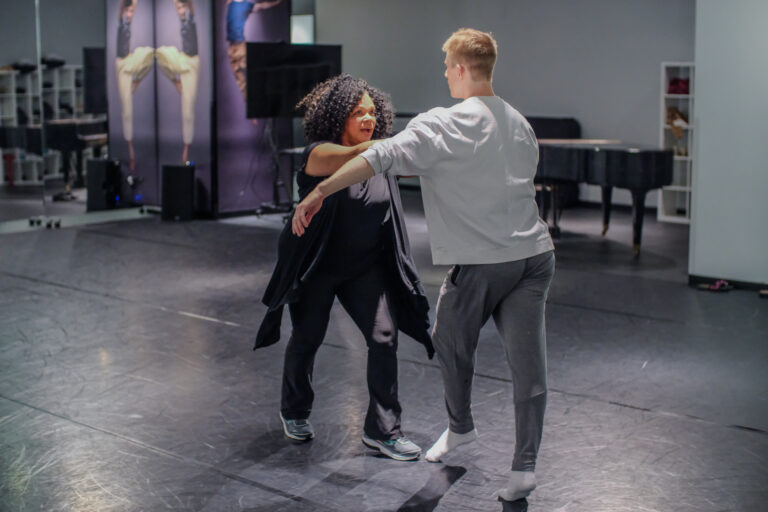
In the past 10 months, we’ve grown accustomed to helping our dancers navigate virtual school, classes and performances. And while brighter, more in-person days may be around the corner—or at least on the horizon—parents may be facing yet another hurdle to help our dancers through: virtual summer-intensive auditions.
In 2020, we learned that there are some unique advantages of virtual summer programs: the lack of travel (and therefore the reduced cost) and the increased access to classes led by top artists and teachers among them. And while summer 2021 may end up looking more familiar with in-person intensives, audition season will likely remain remote and over Zoom.
Of course, summer 2021 may not be back to in-person, and that uncertainty can be a hard pill to swallow. Here, Kate Linsley, a mom and academy principal of Nashville Ballet, as well as “J.R.” Glover, The Dan & Carole Burack Director of The School at Jacob’s Pillow, share their advice for this complicated process.
Pre-audition planning
In normal seasons, dancers are often limited to auditioning for programs that are nearby or those that tour to nearby cities. With virtual auditions, however, your dancer may be faced with an abundance of options, which could prove overwhelming.
To help ground your teen, set some boundaries. For instance, if it’s an in-person faraway summer intensive, will you be comfortable with your dancer traveling that distance? When deciding how many programs to allow your dancer to audition for, remember that even virtual and video auditions usually charge fees, ranging from around $25 to $55.
To create the list of programs for which to audition, “dancers should think about what they want to get out of the program, just like in years past,” says School of Nashville Ballet’s Linsley. Do research about the program’s mission and faculty—don’t only look at the biggest-name intensives or those that friends are interested in. Instead, consider your teen’s career aspirations and make sure the intensives she’s choosing to audition for align. Linsley also advises parents to look at a program’s faculty and the exposure to company directors or artistic staff it may offer.
If your dancer is at home this summer, it could be tempting to overload a daily or weekly schedule. But summer intensives are, well, intense. Long hours during the day should be paired with constructive rest in the evening, not more training. “At Jacob’s Pillow, in addition to the studio classes, rehearsals and discussion sessions, we expect dancers at home to put in an additional two hours of their own time,” says Glover. “That’s at least six hours a day. How much more can a dancer feasibly do, especially if she’s taking up the living room?” Augmenting a virtual intensive with a completely different style or focus can be beneficial—but make sure to strategize with your dancer and home studio teachers to create a schedule that is age and level appropriate.
Similarly, Linsley recommends students (who have this option) attend one program for more weeks instead of signing up for two-week sessions here and there. “The goal is to develop relationships with the teachers, so they know you and know how you move,” she says. “It takes time to get the nuances of what the teachers are saying, and even six weeks is a short time. The longer you’re able to spend at a program, the more you’ll get out of it.”

Michelle Dorrance teaching at a past Jacob’s Pillow intensive. Photo Grace Kathryn Landefeld, courtesy Jacob’s Pillow
Auditions gone digital
While School of Nashville Ballet is currently planning for an in-person summer intensive—but may include an option for admitted dancers to participate remotely, depending on the circumstances—the program’s auditions will be held virtually, via Zoom. If it’s safe and feasible, some dancers may consider asking to rent dance studio space where they can take their live auditions or create a video application. But that could be cost-prohibitive, and, as Linsley says, not necessary, as teachers will modify audition classes to fit dancers’ surroundings.
If your dancer is taking a live audition from home, “dedicate an hour and a half to it, and allow your dancer to have a quiet space,” Linsley advises. “Our teachers are accustomed to seeing a cat wandering through the video on a daily basis. But for an audition, it helps the dancer feel really good and focused if she knows she’s the sole sibling who gets to use the internet or the good computer or iPad.”
It’s also a good idea to do a run-through beforehand to make sure your dancer’s full body is in view of the camera, the volume works, and your dancer doesn’t have to worry about any tech logistics in the moment. Pro tip: Ask a dance teacher to join a Zoom tech-rehearsal of sorts to double-check the set-up if you’re not sure.
Your room’s interior design isn’t going to make or break an audition, says Glover, but it’s still a smart idea to remove knickknacks and move furniture to create a clear space. She also stresses that fancy video equipment isn’t necessary: A smartphone will suffice to film a video audition, and a computer will work for a live Zoom audition. What is necessary is enough lighting. “You might need to grab some lights from other parts of the house and set them up in front of your dancer to make sure they’re really illuminated,” says Glover.
Bracing for change
Summer intensives are big investments of time and money. And while your dancer may have her sights set on a summer program away from home, there is a reality in which plans will change, perhaps due to a surge in COVID-19 cases or a positive test result. It’s also important to realize that in-person class sizes will be limited, and some dancers who audition for an in-person intensive may end up being accepted to the school’s virtual program if there’s a hybrid model. Make sure your dancer is on board for any scenario.
If they’re not posted on the website, ask a school about its protocols—and what happens if in-person classes need to pivot online. At Nashville Ballet, for instance, students who are required to quarantine or who miss classes due to illness will be given access to virtual content but will not be given a refund. For classes that move online due to government closure (like a stay-at-home order), the school will offer prorated refunds of classes. Money aside, it’s smart to ask about COVID protocols to be sure the school is keeping dancers safe and has organized plans for any possible situation.
“As a parent myself, I know the commitment it takes to support our students, whether academically or for extracurricular activities,” says Linsley. “This may not be the summer to try dance camp and soccer camp and cheer camp if you’re just trying everything on for size. But at Nashville Ballet, we’ll move mountains to help dancers find a space to train and grow and be part of this community.”




